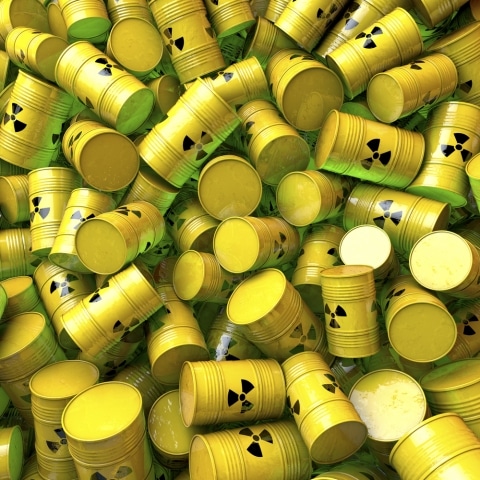As the drilling rush proceeds at a fast pace in Pennsylvania’s Marcellus shale, nearby states have confronted a steady flow of toxic waste produced by the industry. One of Pennsylvania’s most active drilling companies, Range Resources, attempted on Tuesday to quietly ship tons of radioactive sludge, rejected by a local landfill, to one in nearby West Virginia where radioactivity rules are still pending. It was only stopped when local media reports brought the attempted dumping to light.
“We are still seeking information about what happened at the Pennsylvania landfill two months ago when the waste was rejected, and about the radiation test results the company received from the lab,” Kelly Gillenwater, a West Virginia Department of Environmental Protection spokeswoman, told the Pittsburgh Post-Gazette, which had tracked the waste after it was rejected by a Chartiers, PA landfill because it was too radioactive. “For now this is still under investigation.”
It’s one of a series of incidents involving the disposal of fracking’s radioactive waste. Collectively these incidents illustrate how a loophole for the oil and gas industry in federal hazardous waste laws has left state regulators struggling to prevent the industry from disposing its radioactive waste in dangerous ways.
Range Resource’s sludge, transported in two roll-off boxes (the type commonly seen on the backs of dumptrucks), was rejected by the Arden Landfill in Chartiers, PA, a small town west of Pittsburgh, on March 1 after it tripped radioactivity alarms. After returning the radioactive sludge to the wellsite for storage, the company hauled it on Tuesday to the Meadowfield landfill in Bridgeport, WV, an hour and a half drive south of Chartiers.
The Meadowfield landfill, like the Arden Landfill, is owned by Waste Management, but the two sites differ in one crucial respect: Meadowfield lacks a radiation detector, while Pennsylvania law required the Arden landfill to maintain one. So no radiation alarm was triggered at Meadowfield.
Ms. Gillenwater told the local press that West Virginia’s inquires did not begin until state officials read about the dumping in a Pittsburgh newspaper.
Those 12 tons of sludge, from the Malinky wellpad in Smith Township, showed radiation levels of 212 millirems (normal background radiation in the area is roughly 7 to 8 millirems). West Virginia officials said the sludge that’s been dumped in Meadowfield will be allowed to stay.
But Range Resources, which is currently storing unusually radioactive fracking waste at two other wellpads in Pennsylvania’s Washington county, was forbidden to haul that material to West Virginia until regulators find out more about the potential hazards.
Several of Range Resources wells — the MCC and Malinky well pads in Smith Township and the Carter well pad in Mt. Pleasant — have produced sludge with unusually high levels of radioactivity this year.
A Range Resources spokesman, Matt Pitzarella, was quick to dismiss concerns, appearing in local news reports and seeking to downplay the incident.
The levels of radiation were “a little above background levels, but nowhere near unsafe levels,” he Pitzarella said. “This same scenario exists in every single industry,” he told Trib Media Live. Besides, it wasn’t much sludge, he argued. “Picture several wheelbarrows,” he told the West Virginia Tribune.
But some locals said they remain concerned. Matt Pitzarella, the Range spokesman who made the above statements, has had his credibility questioned in the past. Earlier this year, Mr. Pitzarella was found to have misrepresented his education credentials and to have claimed he earned a masters degree in business ethics from Duquesne University. “Matt Pitzarella does not have a degree from Duquesne University,” a spokesperson from the university confirmed in an email sent to Marcellus Monitor.
Range officials waved off those concerns. “What has happened here are a couple of published third-party references to (Pitzarella) that says he has earned a master’s degree,” Range attorney David Poole told ShaleReporter, adding that Mr. Pitzarella had never directly claimed to have earned a diploma, only to have attended the program. Critics, however, pointed out that Mr. Pitzarella had never corrected the errors in his biographies, and that he appears to have overstated the number of years he attended the program.
The levels of radioactivity found in the sludge are in fact over twenty times background levels — not enough to cause harm to anyone standing a few feet away, but enough to cause concern that if the sludge were to wash into one of two nearby creeks, tributaries of the Monongahela River, it could pollute those waterways. In neighboring Ohio, which has also grappled with disposing Pennsylvania’s fracking waste, environmentalists have also raised concerns about how liquid leachate from landfills that store radioactive waste will be disposed.
Perhaps the most striking thing about this incident is the fact that state regulators were only alerted to the shipment by press reports.
For most industries, a federal law, the Resource Recovery and Conservation Act, requires that hazardous materials (haz-mat) be closely tracked and disposed of under tight controls. Shippers must maintain a manifest that tracks every ounce as haz-mat moves from cradle to grave.
But under an exception to that federal law, crafted in 1988, much of the oil and gas industry’s toxic waste is not regulated by the EPA‘s haz-mat rules. Although agency officials discovered strong evidence that the waste was dangerous, pressure from the Reagan White House kept their conclusions out of the report that the agency ultimately delivered to Congress.
With the shale gas rush bringing an unprecedented wave of drilling onshore, the job of keeping tabs on the industry’s toxic waste is in the hands of state regulators. In 2009, Pennsylvania regulators considered — and rejected — a plan to require a manifest system mirroring federal haz-mat tracking standards for fracking waste.
The state does now require landfills to install monitors with alarms that go off if trucks carrying radioactive waste pass through. Landfills are supposed to reject any waste emitting over 150 millirems. A 2012 investigation by the Pittsburgh Post-Gazette found that “nearly 1,000 trucks, carrying a total of 15,769 tons of Marcellus Shale waste were stopped at Pennsylvania landfill gates after tripping radioactivity alarms.”
When those trucks were turned back, that waste had to go elsewhere. And neighboring states have rules about disposing of fracking waste that are far more lax than in Pennsylvania. The patchwork of regulations means that rules can vary dramatically from state to state, and drillers can avoid costly regulatory compliance by crossing state lines.
“[Radioactivity monitoring] currently is not a requirement under West Virginia law,” Gillenwater told West Virginia’s MetroNews. “However, legislation was passed recently requiring the DEP to implement rules related to that and our agency is actually in the process right now of drafting rules related to that.”
Earlier this month, the New Jersey state Senate approved a bill that would ban fracking waste disposal in the state. New York and Massachusetts are considering similar measures. West Virginia’s rules, when they go into effect, will require that radioactive fracking waste be stored in separately constructed lined pits.
But the state that has seen the greatest amount of waste from Pennsylvania’s fracking rush, Ohio, still has weak regulations for solid fracking waste, a May 13 investigation by Propublica concluded. The investigation found that over 100,000 tons of solid waste from Pennsylvania drilling wound up disposed in Ohio.
“It has the potential to leave a toxic legacy,” Alison Auciello of Food and Water Watch, an environmental advocacy organization, told Propublica, “that could turn much of Ohio into potential superfund sites.”
Photo credit: Barrels Casks Drums of Nuclear Waste, via Shutterstock.
Subscribe to our newsletter
Stay up to date with DeSmog news and alerts






